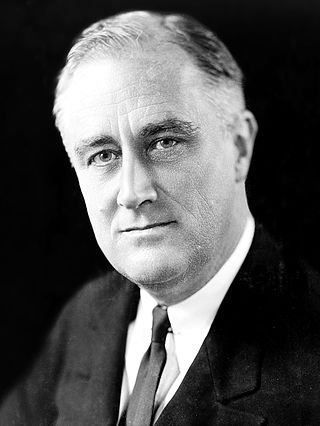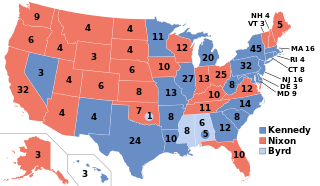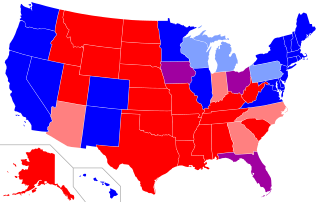
The 2000 United States presidential election was the 54th quadrennial presidential election, held on Tuesday, November 7, 2000. Republican candidate George W. Bush, the governor of Texas and eldest son of the 41st president, George H. W. Bush, won the election, defeating incumbent Vice President Al Gore. It was the fourth of five American presidential elections, and the first since 1888, in which the winning candidate lost the popular vote, and is considered one of the closest U.S. presidential elections, with long-standing controversy about the result.

The Constitution Party, formerly the U.S. Taxpayers' Party until 1999, is a political party in the United States that promotes a religious conservative view of the principles and intents of the United States Constitution. The party platform is based on originalist interpretations of the Constitution and shaped by principles which it believes were set forth in the Declaration of Independence, the Bill of Rights, the Constitution and the Bible.

The 1992 United States presidential election was the 52nd quadrennial presidential election, held on Tuesday, November 3, 1992. Democratic Governor Bill Clinton of Arkansas defeated incumbent Republican President George H. W. Bush, independent businessman Ross Perot of Texas, and a number of minor candidates. The election marked the end of a period of Republican dominance in American presidential politics that began in 1968, and also marked the end of 12 years of Republican rule of the White House, as well as the end of the Greatest Generation's 32-year American rule and the beginning of the Baby boomers 28-year dominance until 2020. It was the last time the incumbent president failed to win a second term until 2020, when Donald Trump lost the election to Joe Biden; it was the first such occurrence since 1980.

The 1932 United States presidential election was the 37th quadrennial presidential election, held on Tuesday, November 8, 1932. The election took place against the backdrop of the Great Depression. The incumbent Republican President Herbert Hoover was defeated in a landslide by Democrat Franklin D. Roosevelt, the Governor of New York and the vice presidential nominee of the 1920 presidential election. Roosevelt was the first Democrat in 80 years to simultaneously win an outright majority of the electoral college and popular vote, a feat last accomplished by Franklin Pierce in 1852, as well as the first Democrat in 50 years to win a majority of the popular vote, which was last done by Samuel J. Tilden in 1876. Hoover was the last incumbent president to lose an election to another term until Gerald Ford lost 44 years later. The election marked the effective end of the Fourth Party System, which had been dominated by Republicans. It was the first time since 1916 that a Democrat was elected president.

The 1960 United States presidential election was the 44th quadrennial presidential election. It was held on Tuesday, November 8, 1960. In a closely contested election, Democratic United States Senator John F. Kennedy defeated the incumbent vice president Richard Nixon, the Republican nominee. This was the first election in which 50 states participated, and the last in which the District of Columbia did not, marking the first participation of Alaska and Hawaii. This made it the only presidential election where the threshold for victory was 269 electoral votes. It was also the first election in which an incumbent president was ineligible to run for a third term because of the term limits established by the 22nd Amendment.

The 1972 United States presidential election was the 47th quadrennial presidential election. It was held on Tuesday, November 7, 1972. Incumbent Republican President Richard Nixon handily defeated Democratic Senator George McGovern of South Dakota, receiving all but 18 of 538 electoral votes. Until the 1984 election, this was the largest margin of victory in the Electoral College for a Republican in a U.S. presidential election, and as of 2023 it remains the last time a presidential candidate captured more than 60% of the popular vote. This was also the most recent election in which the entire Midwest was won by a single candidate, particularly because Minnesota has not voted for a Republican for president since. Despite the seismic scope of President Nixon’s victory, heavy ticket-splitting prevented Republicans from making substantial inroads in the parallel Congressional races.

The 1980 United States presidential election was the 49th quadrennial presidential election, held on Tuesday, November 4, 1980. The Republican ticket of Ronald Reagan and George H. W. Bush defeated incumbent Democratic president Jimmy Carter and incumbent vice president Walter Mondale in a landslide victory. As of 2020, this is the most recent election in which an Democratic president lost reelection.

The president of Singapore, officially the president of the Republic of Singapore, is the head of state of Singapore. The president represents Singapore in official diplomatic functions and possesses some executive powers over the government of Singapore, including control of the national reserves and the ability to veto and revoke public service appointments.

The 2008 United States presidential election was the 56th quadrennial presidential election, held on Tuesday, November 4, 2008. The Democratic ticket of Barack Obama, the junior senator from Illinois, and Joe Biden, the senior senator from Delaware, defeated the Republican ticket of John McCain, the senior senator from Arizona, and Sarah Palin, the governor of Alaska. Obama became the first African American to be elected to the presidency, as well as being only the third sitting United States senator elected president, joining Warren G. Harding and John F. Kennedy. Meanwhile, Biden became the first senator running mate of a senator elected president since Lyndon B. Johnson in the 1960 election.

The Peoples Democratic Party is one of the two major contemporary political parties in Nigeria, along with its main rival, the All Progressives Congress.

Starting with the 2000 United States presidential election, the terms "red state" and "blue state" have referred to U.S. states whose voters vote predominantly for one party — the Republican Party in red states and the Democratic Party in blue states — in presidential and other statewide elections. Examining patterns within states reveals that the reversal of the two parties' geographic bases has happened at the state level, but it is more complicated locally, with urban-rural divides associated with many of the largest changes.

The 2004 United States presidential election was the 55th quadrennial presidential election, held on Tuesday, November 2, 2004. The Republican ticket of incumbent President George W. Bush and his running mate incumbent Vice President Dick Cheney were elected to a second term, defeating the Democratic ticket of John Kerry, a United States senator from Massachusetts and his running mate John Edwards, a United States senator from North Carolina. At the time Bush's popular vote total was the most votes ever received by a presidential candidate, a total that has since been surpassed; additionally, Kerry's total was the second most. Bush also became the only incumbent president to win re-election after losing the popular vote in the previous election. As of 2020, this is the only presidential election since 1988 in which the Republican nominee won the popular vote. In addition, the higher turnout resulted in both major party nominees setting a record for most popular votes received by a major party candidate for president; both men surpassed Reagan's record from 20 years earlier. A the time, Bush's 62,040,610 votes were the most received by any nominee for president, however, his record would be broken by Obama 4 years later.

The 2008 United States elections were held on November 4. Democratic Senator Barack Obama of Illinois won the presidential election, by defeating his challenger, Senator John McCain, and the Democrats bolstered their majority in both Houses of Congress.

The 1980 United States elections were held on Tuesday, November 4. Republican presidential nominee Ronald Reagan defeated incumbent Democratic President Jimmy Carter. Republicans also won control of the Senate, though Democrats retained a majority in the House of Representatives. The election is sometimes referred to as part of the "Reagan Revolution", a conservative realignment in U.S. politics, and marked the start of the Reagan Era.

The 2012 United States presidential election was the 57th quadrennial presidential election, held on Tuesday, November 6, 2012. Incumbent Democratic President Barack Obama and his running mate, incumbent Vice President Joe Biden, were re-elected to a second term. They defeated the Republican ticket of businessman and former Governor Mitt Romney of Massachusetts and Representative Paul Ryan of Wisconsin.

The 2016 United States presidential election was the 58th quadrennial presidential election, held on Tuesday, November 8, 2016. The Republican ticket of businessman Donald Trump and Indiana governor Mike Pence defeated the Democratic ticket of former secretary of state and First Lady of the United States Hillary Clinton and the United States senator from Virginia Tim Kaine, in what was considered a large upset. Trump took office as the 45th president, and Pence as the 48th vice president, on January 20, 2017. It was the fifth and most recent presidential election in which the winning candidate lost the popular vote. It was also the sixth presidential election, and the first since 1944, in which both major party candidates were registered in the same home state.

The Republicans is a liberal-conservative political party in France, largely inspired by the Gaullist tradition. It holds pro-European views. The party was formed on 30 May 2015 from the renaming and refoundation of the Union for a Popular Movement (UMP), which had been established in 2002 under the leadership of then President of France Jacques Chirac.

The 2020 United States presidential election was the 59th quadrennial presidential election, held on Tuesday, November 3, 2020. The Democratic ticket of former vice president Joe Biden and the junior U.S. senator from California Kamala Harris defeated the incumbent Republican president Donald Trump and incumbent vice president Mike Pence. The election took place against the backdrop of the global COVID-19 pandemic and related recession. It was the first election since 1992 in which the incumbent president failed to win a second term. The election saw the highest voter turnout by percentage since 1952, with each of the two main tickets receiving more than 74 million votes, surpassing Barack Obama's record of 69.5 million votes from 2008. Biden received more than 81 million votes, the most votes ever cast for a candidate in a U.S. presidential election.

Presidential primaries and caucuses were organized by the Democratic Party to select the 3,979 pledged delegates to the 2020 Democratic National Convention held on August 17–20 to determine the party's nominee for president in the 2020 United States presidential election. The elections took place in all 50 U.S. states, the District of Columbia, five U.S. territories, and Democrats Abroad, and occurred between February 3 and August 11.

The 2024 United States presidential election will be the 60th quadrennial presidential election, scheduled for Tuesday, November 5, 2024. It will be the first presidential election after electoral votes were redistributed during the 2020 census reapportionment cycle. The incumbent, President Joe Biden, stated in January 2022 his intent to run for reelection with Vice President Kamala Harris as his running mate. As of March 2023, Biden has not formally announced a reelection campaign. In November 2022, former president Donald Trump announced his candidacy for president for a second, nonconsecutive term.


















